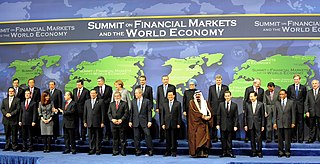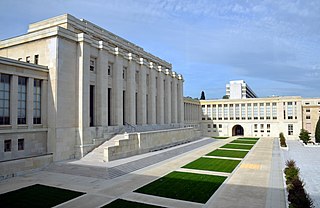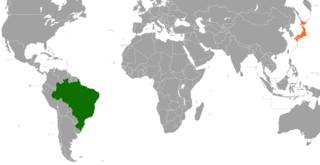Related Research Articles

The United Nations (UN) is an intergovernmental organization whose stated purposes are to maintain international peace and security, develop friendly relations among nations, achieve international cooperation, and be a centre for harmonizing the actions of nations. It is the world's largest and most familiar international organization. The UN is headquartered on international territory in New York City, and has other main offices in Geneva, Nairobi, Vienna, and The Hague.

A non-governmental organization (NGO) or non-governmental organisation is an organization that generally is formed independent from government. They are typically nonprofit entities, and many of them are active in humanitarianism or the social sciences; they can also include clubs and associations that provide services to their members and others. Surveys indicate that NGOs have a high degree of public trust, which can make them a useful proxy for the concerns of society and stakeholders. However, NGOs can also be lobby groups for corporations, such as the World Economic Forum. NGOs are distinguished from international and intergovernmental organizations (IOs) in that the latter are more directly involved with sovereign states and their governments.

The foreign relations of Canada are Canada's relations with other governments and nations. Canada is recognized as a middle power for its role in international affairs with a tendency to pursue multilateral solutions. Canada's foreign policy based on international peacekeeping and security is carried out through coalitions and international organizations, and through the work of numerous federal institutions. Canada's peacekeeping role during the 20th century has played a major role in its global image. The strategy of the Canadian government's foreign aid policy reflects an emphasis to meet the Millennium Development Goals, while also providing assistance in response to foreign humanitarian crises.

International development or global development is a broad concept denoting the idea that societies and countries have differing levels of economic or human development on an international scale. It is the basis for international classifications such as developed country, developing country and least developed country, and for a field of practice and research that in various ways engages with international development processes. There are, however, many schools of thought and conventions regarding which are the exact features constituting the "development" of a country.

In international relations, a middle power is a sovereign state that is not a great power nor a superpower, but still has large or moderate influence and international recognition.
Development studies is an interdisciplinary branch of social science. Development studies is offered as a specialized master's degree in a number of reputed universities around the world. It has grown in popularity as a subject of study since the early 1990s, and has been most widely taught and researched in developing countries and countries with a colonial history, such as the UK, where the discipline originated. Students of development studies often choose careers in international organisations such as the United Nations, World Bank, non-governmental organisations (NGOs), media and journalism houses, private sector development consultancy firms, corporate social responsibility (CSR) bodies and research centers.
Human security is a paradigm for understanding global vulnerabilities whose proponents challenges the traditional notion of national security through military security by arguing that the proper referent for security should be at the human rather than national level. Human security reveals a people-centred and multi-disciplinary understanding of security which involves a number of research fields, including development studies, international relations, strategic studies, and human rights. The United Nations Development Programme's 1994 Human Development Report is considered a milestone publication in the field of human security, with its argument that ensuring "freedom from want" and "freedom from fear" for all persons is the best path to tackle the problem of global insecurity.

The School of International Service (SIS) is American University's school of advanced international study, covering areas such as international politics, international communication, international development, international economics, peace and conflict resolution, international law and human rights, global environmental politics, and U.S. foreign policy.

International security, also called global security is a term which refers to the measures taken by states and international organizations, such as the United Nations, European Union, and others, to ensure mutual survival and safety. These measures include military action and diplomatic agreements such as treaties and conventions. International and national security are invariably linked. International security is national security or state security in the global arena.
Global studies (GS) is the interdisciplinary study of global macro-processes. Predominant subjects are global politics, economics, and law, as well as ecology, geography, culture, anthropology and ethnography. It distinguishes itself from the related discipline of international relations by its comparatively lesser focus on the nation state as a fundamental analytical unit, instead focusing on the broader issues relating to cultural and economic globalisation, global power structures, as well of the effect of humans on the global environment.

The Globalization of World Politics: An Introduction to International Relations is an introduction to international relations (IR) and offers comprehensive coverage of key theories and global issues.Edited by John Baylis, Patricia Owens, and Steve Smith. It has eight editions, first published in 1997, in this book leading scholars in the field introduce readers to the history, theory, structures, and key issues in IR, providing students with an ideal introduction and a constant guide throughout their studies.
David Woodward is a British economist and economic advisor. He graduated from Keble College, Oxford in philosophy, politics and economics in 1982. After graduating, he joined the Foreign and Commonwealth Office in London, where he worked as an economic advisor working on debt, structural adjustment and other development issues, with emphasis on Latin America and South East Asia.

Global Peace Index (GPI) is a report produced by the Institute for Economics & Peace (IEP) which measures the relative position of nations' and regions' peacefulness. The GPI ranks 163 independent states and territories according to their levels of peacefulness. In the past decade, the GPI has presented trends of increased global violence and less peacefulness.

China–Sudan relations are the bilateral relations between the People's Republic of China and the Republic of Sudan. China is currently one of Sudan's largest trade partners, importing oil and exporting low cost manufactured items as well as armaments into the country. Both states enjoy a very robust and productive relationship in the fields of diplomacy, economic trade, and political strategy. They formally established diplomatic relations on January 4, 1959, when Sudan formally recognized the sovereignty of the People's Republic of China and have since become close global allies, supporting each other in times of internal crises and international controversy such as during the Second Sudanese Civil War, the Darfur Crisis, and the Xinjiang Conflict. China continues to provide massive support to Sudan by developing its oil resources and supplying millions of dollars in loans, aid, foreign direct investments, and humanitarian assistance. In return, Sudan has become a reliable political and economic ally in the international arena, allowing China to maintain a significant stake in its oil sector.

An international organization or international organisation, also known as an intergovernmental organization or an international institution, is a stable set of norms and rules meant to govern the behavior of states and other actors in the international system. Organizations may be established by a treaty or be an instrument governed by international law and possessing its own legal personality, such as the United Nations, the World Health Organization and NATO. International organizations are composed of primarily member states, but may also include other entities, such as other international organizations, firms, and nongovernmental organizations. Additionally, entities may hold observer status.

Brazil–Japan relations are the current and historical international relations between Brazil and Japan. The diplomatic relations were officially established on 5 November 1895 with the Treaty of Friendship, Commerce and Navigation signed in Paris. Early relations were dominated by the Japanese immigration issues. The total number of Japanese immigrants reached 190,000 in the pre-World War II period. Now, more than 2 million Brazilians are of Japanese descent, making Brazil host to the largest Japanese community outside Japan. At the same time, Japan is host to the third largest Brazilian population, most being of Japanese origin. Both nations are members of the G4 nations, G20 and World Trade Organization.
The Fletcher School of Law and Diplomacy is the graduate school of international affairs of Tufts University, in Medford, Massachusetts. The School is one of America's oldest graduate schools of international relations and is well-ranked in its masters and doctoral programs. As of 2017, the student body numbered around 230, of whom 36 percent were international students from 70 countries, and around a quarter were U.S. minorities. The school's alumni network numbers over 9,500 in 160 countries, and includes ambassadors, diplomats, foreign ministers, high-ranking military officers, heads of nonprofit organizations, and corporate executives.

Amitav Acharya is an Indian-born Canadian scholar and author, who is Distinguished Professor of International Relations at American University, Washington, D.C., where he holds the UNESCO Chair in Transnational Challenges and Governance at the School of International Service, and serves as the chair of the ASEAN Studies Initiative. Acharya has expertise in and has made contributions to a wide range of topics in International Relations, including constructivism, ASEAN and Asian regionalism, and Global International Relations. He became the first non-Western President of the International Studies Association when he was elected to the post for 2014–15.
Caroline King-Okumu is an international development opportunities manager for the UK Centre for Ecology and Hydrology. She was formerly a senior researcher for the International Institute for Environment and Development (IIED). Her major areas of research are dryland ecosystems, economic and environmental assessment, and climate change. She is considered an international expert on land and water management, particularly drylands agriculture. King-Okumu is based in Kenya but is involved in research and projects throughout the world.

The Non-Aligned Movement (NAM) is a forum of 120 countries that are not formally aligned with or against any major power bloc. After the United Nations, it is the largest grouping of states worldwide.
References
- ↑ "Caroline Thomas 1959 – 2008 :: University of Southampton". Archived from the original on 8 February 2012. Retrieved 29 September 2011.
- ↑ "Caroline Thomas, 1959-2008". Timeshighereducation.co.uk. 6 November 2008. Retrieved 11 October 2018.